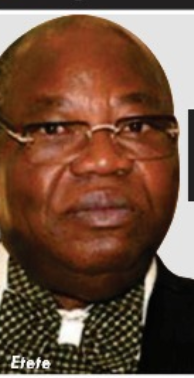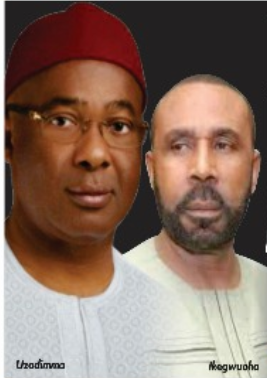By Tony Icheku
After twenty-eight years of crisis, negotiations and litigations over what has come to be known as Malabu Oil Prospecting Licence, OPL 245 saga, a light now appears on the horizon for a final resolution of the controversial oil deal and the curtains drawn over it.
From April 9, 1998, when the late General Sani Abacha-led Federal Military Government awarded OPL 245 to Malabu Oil and Gas Ltd, four former Presidents of the Country including Olusegun Obasanjo; late Umoru Yar’Adua; Goodluck Jonathan and Mohammadu Buhari has had cause to open investigations on the matter or to be dragged to the courts either in London, Milan of the Americas over the matter. Even a House of Representatives Committee in 2003 investigated the contentions over OPL 245 sale and ownership.
Speaking recently on the moves to close the file on OPL 245, the Minister of State for Petroleum Resources, Sen Heineken Lokpobiri told journalists that President Bola Tinubu has ordered the Minister for Justice/Attorney-General of the Federation, Lateef Fagbemi, to clear court cases on $1.3 billion deepwater now Oil Mining Licence, OML 245 oil block located in the Niger Delta.
Others mobilised to implement the President’s directive include the Minister; Economic and Financial Crimes Commission (EFCC); The Nigerian Upstream Petroleum Regulatory Commission, (NUPRC) and Nigerian National Petroleum Company Limited, (NNPC Ltd).
The Minister said that parties involved in the deal including Shell, Eni, the Italian oil company were currently negotiating with the Government to end the more than 28 years crisis and litigation surrounding the prolific oil block
“The previous administration initiated most of the cases that we are talking about today, and they took us to court, while we took Eni, Malabu, others to different courts in Europe, Canada, etc, but we didn’t win any of the cases.
“To even shock you, there is one that got us a penalty of over £70 million” he said, explaining that JP Morgan, a financial institution sued the Federal Government for trying to smear its image in the saga, adding that the fine imposed by the Court remain binding on Nigeria.
“So we have been fined over £70 million by the court. Who will pay that? You and I will pay that, or our children will pay, because it is a judgement debt.
“And in all the ones that we pursue both in Switzerland and other locations, we have no evidence to get conviction.
“And so it makes sense for this government to come and say that for 28 years, this block has been idle. This block is a prolific block that will add so much value to our economy, so let’s see how we can resolve the problem,” he said.
On a sad note, even as the Federal Government which ought to have the last say on the matter works to close the file on the case, some naysayers have orchestrated moves to continue dragging the name of Chief Dan Etete, former Minister of Petroleum Resources in the mud over the matter.
These individuals priding themselves as ‘powerful and highly placed’ have bones to grind with Chief Dan Etete under whose watch as Minister of Petroleum Resources the Malabu OPL 245 transaction was effected. They believe he should play the scapegoat to clean up the scandal, notwithstanding the fact that no court of law from Abuja, Lagos, London to Milan to which he had been dragged had found him culpable in the matter
On March 17, 2021, after more than three years of investigations and legal proceedings, in Milan, Italy leading to very high costs and serious and unjust reputational consequences for Etete, justice eventually took its course, confirming with a definitive sentence his complete acquittal, because “there is no case to answer”.
Etete’s acquittal was further affirmed on November 11, 2022, when the Court of Appeal of Milan rejected the apeal by the Nigerian government, thus confirming the first-instance ruling and condemning Nigeria to bear all court fees
Etete, hailed the verdict of the Italian court as “significant and wide ranging”.
The statement added that the Milan judgement “independently follows the path of the UK’s trial and decision (double jeopardy) on the malicious prosecution of the Nigerian Government.”
The former oil minister described the decision as “significant and wide ranging”, adding that it also affirms that the “settlement agreements on transfer from Malabu to Shell and ENI were valid.” He further noted that the court has confirmed that no bribes were paid to anyone and that there is no case to answer on the issue.
“These matters have occupied the Milan Courts for over 3 years, with almost 200 witnesses. The FGN and Prosecutor’s position has been found to be entirely baseless – No case to even answer said the Court,” he said.
“Milan was actively chosen by FGN to determine the issue of alleged corruption on OPL 245. They lost and must rightly live with that decision.
“The High Court in London ruled that FGN made the conscious choice to determine all alleged corruption on OPL 245 in Milan, both civilly and criminally. Both have now rightly lost in the jurisdiction they themselves chose.
“The acquittal in Milan is therefore determinative in all jurisdictions, including Nigeria. Any and every Order made against Chief Dan Etete in any Nigerian court or directly or indirectly in any other court on alleged corruption on OPL 245 are hereinafter entirely invalid and will be struck out.”
Etete added that he and Malabu have jointly and separately suffered “massive and unquantifiable losses” as a result of what he described as “malicious and politically motivated wrongful allegation of corruption.”
Mr Etete said agreements are meant to be honoured and serious allegations of fraud need to be particularized and proven. The Nigerian government did neither, he argued, adding that the government now faces a valid, irrefutable claim for omission and commission on OPL 245 which should never have happened
“The Court confirmed that no bribes were paid to anyone and that there is no case to answer on the issue,” a statement issued by Etete through his counsel then stated.
“The acquittal in Milan is therefore determinative in all jurisdictions, including Nigeria.
“Any and every order made against Chief Dan Etete in any Nigerian court or directly or indirectly in any other court on alleged corruption on OPL 245 are hereinafter entirely invalid and will be struck out.”
Etete noted that his reputation dropped over allegations of corruption levelled against him, adding that Malubu also lost over $10 billion
“Those losses exceed US$10 billion which are entirely and properly recoverable against FGN. The legal tests of remoteness and measure of damages are conclusively and legally satisfied.
“Importantly, that Arbitration stimulated a settlement, with duress, whereby Malabu was forced to accept US$1.2 billion for a concession with a proper market value of at least US$8-9 billion
“Malabu was therefore deprived of approximately US$8-9 billion in value on sale at the time, but over US$15 billion if allowed to develop the oil block as contractually agreed and upon which Malabu paid a signature bonus of US$210 million to the Federal Government of Nigeria.”
All the facts as proffered and affirmed by the courts nothwithstanding, Etete is still being tried in absentia by the Economic and Financial Crimes Commission (EFCC).
Etete, appointed as Nigeria’s Minister of Petroleum Resources in 1995, played a pivotal role in introducing the marginal oil field regime and indigenous participation in Nigeria’s oil and gas industry. His contributions have however been beclouded by the controversy around the controversial OPL 245, becoming the focus of a protracted legal battle involving major oil companies amid allegations of corruption that have marred his reputation and overshadowed his contributions to Nigeria’s oil sector.
Etete’s ordeal is not isolated. Globally, individuals have faced similar legal battles, where accusations are levied, with years spent in court, only to culminate in acquittals. These cases highlight systemic issues within legal frameworks that allow for the weaponization of justice, often driven by political or economic motivations.
In the UK, the case of the Birmingham Six remains a stark reminder of the fallibility of justice systems. Six Irish men were wrongfully convicted in 1975 for pub bombings in Birmingham, based on coerced confessions and questionable forensic evidence. After 16 years of imprisonment, their convictions were quashed in 1991, revealing systemic flaws such as investigative misconduct and the suppression of evidence.
The term “weaponization of justice” refers to the deliberate manipulation of legal systems to achieve objectives beyond the pursuit of truth and fairness. The weaponization of legal technicalities, whether through coerced confessions, mishandled evidence, or political interference, undermines the foundational principles of justice.
In Etete’s case, the prolonged legal battles, despite eventual acquittal, suggest an abuse of judicial processes, leading to reputational damage. Despite his achievements that merit recognition, and most notably his discharge and acquittal in three jurisdictions – Italy, United Kingdom and Nigeria, the former Minister remains the focal point of smear campaigns.
It does bear repeating that since the English and Italian courts having found Etete not guilty, with no case to answer the implications are that there was insufficient evidence to prove he committed the alleged offences. This means the accused is released from the legal process and is free to go. If Chief Dan Etete has been found to have done nothing wrong by the Nigerian legal system, where the judiciary has come under scrutiny in recent times, is it being insinuated that the course of justice was perverted in those other jurisdictions?
In reflecting upon the Etete cases, it becomes evident that the pursuit of justice requires constant vigilance, systemic introspection, and unwavering commitment to fairness.
Politically Exposed Persons (PEPs) often find themselves under intense scrutiny due to their influential positions, making them susceptible to allegations of corruption. In several instances, PEPs have been wrongfully accused and, despite subsequent exoneration, have suffered significant reputational damage due to smear campaigns. Four notable cases from different countries clearly illustrates these points:
Former Ghanaian President John Dramani Mahama was implicated in a bribery scandal involving Airbus SE, with allegations suggesting his involvement through his brother, Samuel Adam Mahama. These claims, lacking substantial evidence, were perceived as politically motivated to tarnish Mahama’s reputation and divert attention from governmental shortcomings. The Office of the Special Prosecutor (OSP) eventually exonerated Mahama, but the smear campaign had already inflicted damage on his public image.
Nigeria’s former President of the Senate, Sen. Adolphus Wabarafaced allegations in 2005 of accepting a ₦55 million bribe to influence budget approvals. Despite his resignation and a prolonged 14-year legal battle, Wabara was acquitted in 2019 due to insufficient evidence.
Former Zambian President, Frederick Chiluba faced allegations of embezzling public funds after his tenure ended in 2002. Following a protracted legal process, Chiluba was acquitted of all charges in 2009. The court determined that the prosecution failed to provide compelling evidence linking him to the alleged crimes. This verdict underscored the challenges in distinguishing between political vendettas and genuine anti-corruption efforts.
Former Bangladeshi Prime Minister, Khaleda Zia was accused of misusing funds related to the Zia Charitable Trust, leading to her conviction and imprisonment in 2018. In November 2024, the Supreme Court of Bangladesh acquitted Zia and all co-accused, citing a lack of credible evidence.
Nabil Sayadi, director of the European branch of the Global Relief Foundation, was accused of transferring funds to an Al-Qaeda financier, leading to his inclusion on international watch-lists and the freezing of his assets. In 2006, Belgian judges exonerated Sayadi, citing a lack of evidence linking him to terrorist activities.
These cases highlight the profound impact that unfounded corruption allegations and smear campaigns can have on PEPs, often resulting in lasting reputational harm even after legal exoneration. While many accusations are substantiated, there are notable instances where PEPs have been wrongfully accused and subsequently exonerated by the legal system.
Etete’s experience, like the ones already referenced, serves as a stark reminder of the potential for justice systems to be weaponised. It calls for introspection and reform to safeguard the principles of fairness and equity, ensuring that individuals are protected from undue legal persecutions driven by interests that have little to do with justice.
The OPL, now OML 245 covers a defined deep-water offshore area (over 1,000 m bsl), approximately 150 km off the Niger Delta. OPL 245 requires significant investments – amounting to several hundred million dollars – and will require further investments worth billions over a number of years to come before having any chance to proceed with full-scale oil production activities. For 28 years not a single oil barrel has been drilled.
As the Tinubu administration offers a leeway out of the imbroglio, individuals and corporate on going-concerns must resolve to move forward for the sake of the Nation and also allow those who served the Country their well deserved rest.





